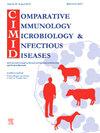由人类和动物的寄生虫感染引起的DNA损伤
IF 2
3区 农林科学
Q4 IMMUNOLOGY
Comparative Immunology Microbiology and Infectious Diseases
Pub Date : 2025-04-08
DOI:10.1016/j.cimid.2025.102337
引用次数: 0
摘要
在许多国家,包括原生动物和蠕虫在内的寄生虫感染引起的病理仍然是卫生保健的负担。DNA损伤是由许多寄生虫造成的,包括原生动物和蠕虫。然而,致癌寄生虫的确切数量及其在肿瘤形成中的作用仍不确定。寄生虫感染的进展和动态受到内源性氧化应激(OS)增加的显著影响。ROS的增加破坏了促氧化剂和抗氧化剂之间的平衡,从而破坏了抗氧化防御机制,导致包括宿主DNA在内的重要生物分子的结构损伤。DNA损伤的产生可能导致癌变的进展。然而,寄生虫、虫卵和寄生虫释放的因子也可能直接损伤DNA,并导致基因组不稳定,这是大多数人类和动物癌症的一个标志。了解寄生虫诱导宿主DNA损伤的方式可能有助于控制寄生虫感染和预防寄生虫诱导的恶性肿瘤,最终有益于人类和动物的健康。本文综述了寄生虫感染诱导的DNA损伤机制的最新进展。本文章由计算机程序翻译,如有差异,请以英文原文为准。
DNA damage induced by parasitic infections in humans and animals
Pathologies caused by parasitic infections, including protozoans and helminths remain a burden for healthcare in many countries. The DNA damage is produced by numerous parasites, both protozoans and helminths. However, the exact number of cancer-causing parasites and their role in neoplasma formation is still undetermined. The progression and dynamics of parasitic infections are significantly influenced by endogenously induced increase in oxidative stress (OS). Increased ROS production undermines antioxidant defense mechanisms by disrupting the balance between prooxidants and antioxidants, causing structural damage to important biomolecules, including host DNA. The generation of DNA damage possibly leads to the progression of carcinogenesis. However, direct DNA damage by parasites, eggs and factors released by parasites is also possible, and it leads to genomic instability that is a hallmark of most human and animal cancers. Understanding the way parasites induce DNA damage in the hosts may be helpful in the control of parasitic infections and the prevention of parasite-induced malignancies, ultimately benefiting the health of humans and animals. This review article offers an updated overview of parasitic infection-induced DNA damage mechanisms.
求助全文
通过发布文献求助,成功后即可免费获取论文全文。
去求助
来源期刊
CiteScore
4.60
自引率
0.00%
发文量
102
审稿时长
40 days
期刊介绍:
Comparative Immunology, Microbiology & Infectious Diseases aims to respond to the concept of "One Medicine" and to provide a venue for scientific exchange. Based on the concept of "Comparative Medicine" interdisciplinary cooperation between specialists in human and animal medicine is of mutual interest and benefit. Therefore, there is need to combine the respective interest of physicians, veterinarians and other health professionals for comparative studies relevant to either human or animal medicine .
The journal is open to subjects of common interest related to the immunology, immunopathology, microbiology, parasitology and epidemiology of human and animal infectious diseases, especially zoonotic infections, and animal models of human infectious diseases. The role of environmental factors in disease emergence is emphasized. CIMID is mainly focusing on applied veterinary and human medicine rather than on fundamental experimental research.

 求助内容:
求助内容: 应助结果提醒方式:
应助结果提醒方式:


